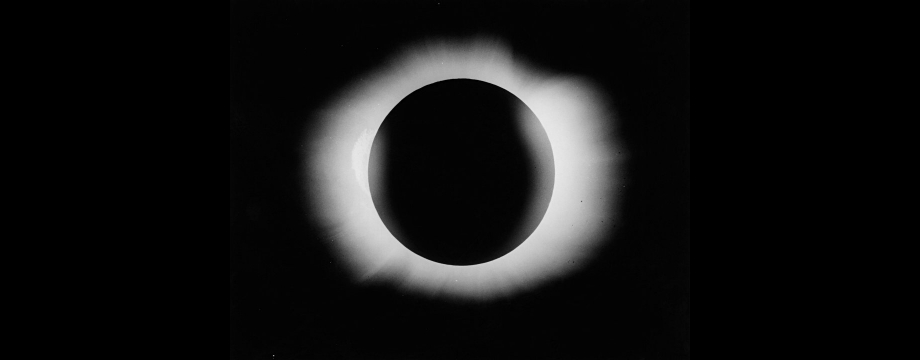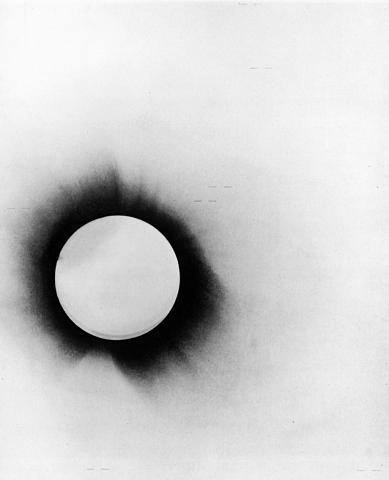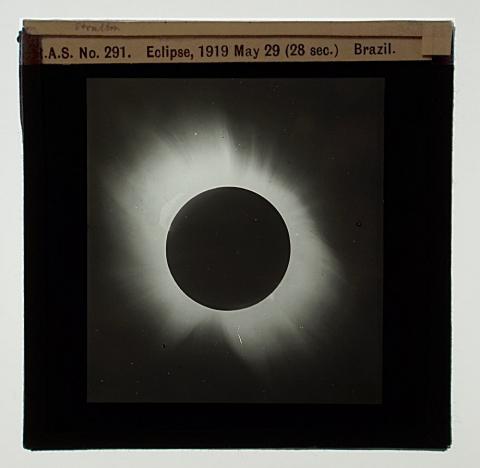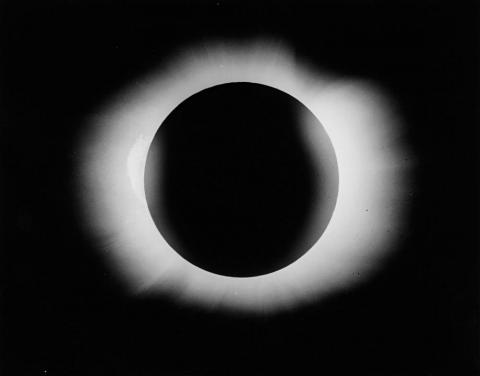
Celebrations are underway across the globe to commemorate 100 years since a UK-led expedition confirmed Einstein’s theory of general relativity. The theory fundamentally changed our understanding of physics and astronomy, and underpins critical modern technologies such as the satellite-based Global Positioning System (GPS). A series of public events in the UK and around the world will mark this seminal anniversary.
The theory of relativity is essential for the correct operation of GPS systems, which in turn are relied on in many common applications including vehicle satellite navigation (SatNav) systems, weather forecasting, and disaster relief and emergency services. However the world had to wait decades before the applications of such a blue skies result could be realised.
On 29 May 1919, astronomer Sir Arthur Eddington verified Einstein’s General Theory of Relativity by observing the apparent deflection of stars from their normal positions during a solar eclipse. This happens because, according to Einstein’s theory, the path of light is bent by gravity when it travels close to a massive object like our Sun.
This effect is measurable during a solar eclipse, when the Sun’s light is blocked by the Moon. At such times, the light from the background stars closest to the edge of the Sun is bent, and so these stars appear to be in slightly different positions compared to when they are observed at other times.
The result was based on measurements taken by two UK-led expeditions, one to the island of Principe off the west coast of Africa, and the other to Sobral in Brazil. Two sites were chosen to increase the chances of success, and to ensure good conditions for viewing the eclipse.
The expeditions were jointly funded by the Royal Astronomical Society (RAS), the Royal Society, and the Royal Irish Academy, and organised by the Royal Observatory Greenwich. When the results were announced at a joint meeting of the RAS and Royal Society in November of the same year, it made Einstein world famous within days.
In the UK this bank holiday weekend, the Observatory Science Centre in Herstmonceux, Sussex will be celebrating with a week of family friendly activities and talks from 25 May to 2 June, including a live video-link with Principe, one of the eclipse expedition sites.
At Burlington House in London, on 29 and 31 May, the Royal Astronomical Society will host solar observing events (weather permitting), and the library will display historical images and documents related to the 1919 eclipse. Visitors will also encounter actors playing the roles of Arthur Eddington and Albert Einstein.
Other celebratory activities will be taking place in the UK, Portugal, Principe, Sobral and around the world: more information on all of the events can be found on the Eclipse 1919 events page.
Prof. Mike Cruise, President of the Royal Astronomical Society, said, "A century ago astronomers confirmed the general theory of relativity – in the process transforming our understanding of the Universe for ever. The work of Einstein and Eddington is an amazing example of international collaboration in the aftermath of the first world war, and a visible demonstration of how science can overcome barriers in these turbulent times.”
In November the RAS and Royal Society will host a conference and public event marking the 100th anniversary of the announcement of the results. The commemoration forms part of the centenary of the International Astronomical Union, founded in 1919, with more than 200 schools around the world signed up to explore the role of gravity in astronomy.
Media contacts
Dr Robert Massey
Royal Astronomical Society
Tel: +44 (0)20 7292 3979
Mob: +44 (0)7802 877 699
Dr Morgan Hollis
Royal Astronomical Society
Mob: +44 (0)7802 877 700
Prof. Robert Walsh
IAU100 link and Professor of Solar Physics
University of Central Lancashire
Images and captions



Higher resolution versions of these images are available via the Science Photo Library, at https://www.sciencephoto.com/
Further information
More information on the expeditions, science, and global events can be found on the Eclipse 1919 website at https://eclipse1919.org/
Notes for editors
The Royal Astronomical Society (RAS, www.ras.ac.uk), founded in 1820, encourages and promotes the study of astronomy, solar-system science, geophysics and closely related branches of science. The RAS organizes scientific meetings, publishes international research and review journals, recognizes outstanding achievements by the award of medals and prizes, maintains an extensive library, supports education through grants and outreach activities and represents UK astronomy nationally and internationally. Its more than 4,000 members (Fellows), a third based overseas, include scientific researchers in universities, observatories and laboratories as well as historians of astronomy and others.
The RAS accepts papers for its journals based on the principle of peer review, in which fellow experts on the editorial boards accept the paper as worth considering. The Society issues press releases based on a similar principle, but the organisations and scientists concerned have overall responsibility for their content.
Twitter: https://twitter.com/royalastrosoc
Facebook: https://facebook.com/royalastrosoc
Instagram: https://www.instagram.com/royalastrosoc/
YouTube: https://www.youtube.com/user/RoyalAstroSoc

